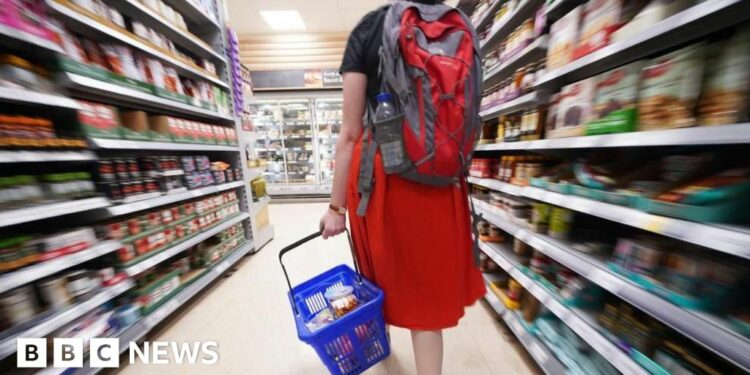The government has dropped plans for “Not for EU” labelling of British food products being sold throughout the UK.
The labels are required in Northern Ireland as part of the UK’s deal with the EU to reduce checks on British products entering NI.
The last government had proposed compulsory UK-wide labelling as way of making sure retailers did not stop supplying NI.
Now the government will monitor the supply of products to NI and only require UK-wide labelling if it is clear a problem is developing.
It is understood that during a consultation retailers gave assurances to the government that supplies to NI will be maintained.
The government will hold legislation in reserve to implement labelling generally, or on specific products, if those assurances are breached.
There have been fears among some businesses and unionist politicians that requiring a separate label for NI could lead to some products being withdrawn.
The 2019 Brexit deal for Northern Ireland – known as the NI Protocol – kept Northern Ireland inside the EU single market for goods, which allowed a free flow of goods across the Irish border.
However, it made trading from Great Britain to Northern Ireland more difficult and expensive.
Checks and controls on GB food products entering NI were some of the biggest practical difficulties.
Under a revised deal, known as the Windsor Framework, UK public health and safety standards now apply for retail food and drink in NI.
That means GB traders who are sending food for sale in Northern Ireland face few routine checks and reduced paperwork.
The flipside of this is the introduction of “Not for EU” labels on GB food products, to give an assurance to the EU that these products would not wrongly be sold in its single market.
A second round of “Not for EU” implementation begins in Northern Ireland on Tuesday, with the labels required on dairy products.
The final stage of implementation is due in July 2025.
Food products produced in NI do not need the labelling because they are still manufactured to EU standards.
Earlier this month the government said two elements of the Windsor Framework which were due to be implemented at the start of the October have been delayed until next year.
New customs processes for parcels and freight have now been delayed until March 2025 at the earliest.
Some businesses had expressed concerns that there had not been enough time to prepare for the changes.
The UK government said it welcomed the ongoing commitment of businesses to continue to serve their customers in Northern Ireland.
“Based on that engagement, we will not proceed with the introduction of ‘not for EU’ labelling on a mandatory basis in Great Britain on 1 October 2024.
“We remain committed to ensuring that we safeguard the supply of supermarket supplies into Northern Ireland on an ongoing basis.
“We will work intensively with industry to monitor those supplies and to be assured that they will be maintained as the implementation of the Windsor Framework continues.”
Source link : http://www.bing.com/news/apiclick.aspx?ref=FexRss&aid=&tid=66fab9214afd4e4c96d1fff03e801da5&url=https%3A%2F%2Fwww.bbc.com%2Fnews%2Farticles%2Fc62rnmr1lr8o&c=11634231228672935407&mkt=de-de
Author :
Publish date : 2024-09-30 07:34:00
Copyright for syndicated content belongs to the linked Source.


